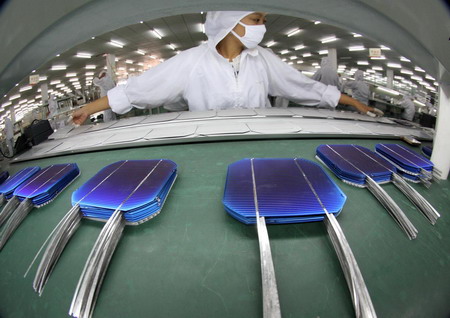|
|

|
|
A worker assembles solar battery panels at a factory in Nantong, Jiangsu province. Experts said at the 2010 China (Chengdu) New Energy International Forum and Fair that the government should take more steps to develop the domestic solar energy market. [Zhang Xiaoyu / for China Daily]
|
Xushuang Solar Company, a subsidiary of Hebei Dongxu Investment Group Co, on Wednesday inked an agreement with its Tanzanian partner to invest 500 million yuan ($74.77 million) in a thin-film solar cell project in the African country.
The project will have a production capacity of 20 megawatts (mW).
On the same day, during the China (Chengdu) New Energy International Forum & Fair 2010, Tongwei Group signed another contract with the economic development zone of Shuangliu county in Chengdu to build a base for a whole photovoltaic production line.
The solar energy industry usually hits a bottleneck when the big players start to face production pressure.
And, they have already been hit by mounting order books.
Xie Xiaonan, vice-president of Suntech Power Holdings Co, said the company's production had touched 1,000 mW by Sept 6, and he estimated whole year production to touch 1,500 mW.
"We have to speed up to expand because of the increasing order book. The 1,500 mW can only meet 75 percent of our clients' needs," Xie said.
Experts said the government should take more steps to enlarge the domestic solar energy market and increase the domestic demand for photovoltaic products to help in the sustainable development of the industry.
Shi Dinghuan, counselor of the State Council of China and president of the Chinese Renewable Energy Society, said the nation must seriously regard the renewable energy sector as a substitute for traditional energy sources instead of as a supplement to it.
China produces nearly 40 percent of the photovoltaic cells in the world, but more than 90 percent of its products are exported. The photovoltaic products manufacturers depend heavily on foreign solar energy markets.
"Governments at all levels need to do more to make better policies to provide a more profitable business environment for the solar energy industry as well as for other renewable energy sources," said Shi.
The US, Europe and China are the three leading players in the solar energy industry.
The growth rate of the photovoltaic industry next year will be slower than this year's, many experts believe. It means investors will have to face more competition, they say.
According to Pu Guisen, director of the new energy industry office in Shuangliu County in Chengdu, the central government has carried out only two supportive programs so far to help the development of the solar energy industry.
Statistics show that the two programs, together with some other photovoltaic programs at local government levels, only catered to around 258 mW in photovoltaic products demand in 2009, even as the total output of photovoltaic cells last year was 4,000 mW. The domestic market consumed only 6.5 percent of the industry's total production.
Li Hejun, chairman of the China New Energy Commerce Chamber, said that the government should give more incentives to the renewable energy industry.
"I feel that renewable energy applications in China has been underestimated by most people, especially administrative department officials," said Li. "There is often a gap between the estimates and real production capacities."
Professor Martin Green of the University of New South Wales agreed that the key to widen the bottleneck was to enhance the domestic market.
According to Pu, the total construction area in China was 50 billion square meters, one-fifth of which was suitable for the application of solar energy technology.
"If we install the photovoltaic system in 20 percent of buildings in China, the system would produce 200,000 mW of power," said Pu. "The potential market is huge."
However, some insiders have voiced different views.
Excessive and rapid development could be dangerous for the industry, they have said.
Li Junfeng, deputy director of the Energy Research Institution of the National Development and Reform Commission, said it might cause trouble if the central government implements more policies to improve solar energy development.
"We must control the pace of the development of the new energy industry," Li said.
|